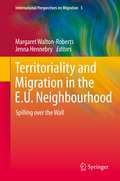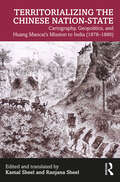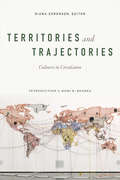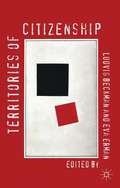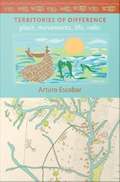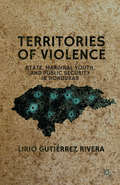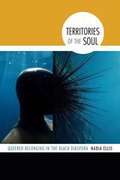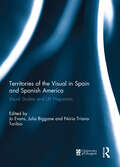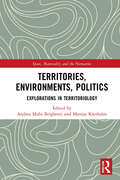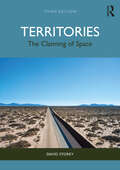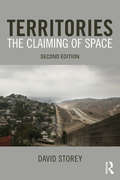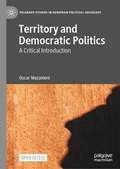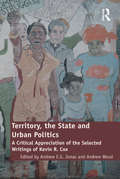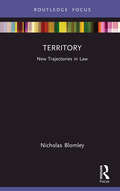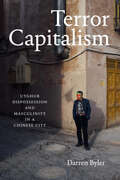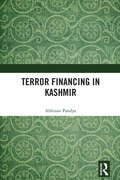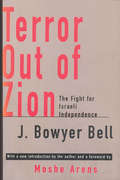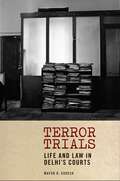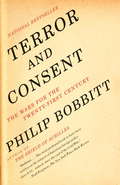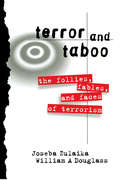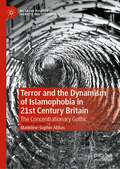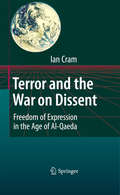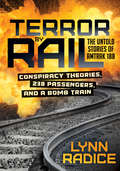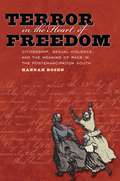- Table View
- List View
Territoriality and Migration in the E.U. Neighbourhood: Spilling over the Wall
by Margaret Walton-Roberts Jenna HennebryThis volume brings together an interdisciplinary group of scholars around an important question: how has migration changed in Europe as the European Union has enlarged, and what are the consequences for countries (and for migrants themselves) inside and outside of these redrawn jurisdictional and territorial borders? By addressing this question the book contributes to three current debates with respect to EU migration management: 1) that recent developments in EU migration management represent a profound spatial and organizational reconfiguration of the regional governance of migration, 2) the trend towards the externalization or subcontracting of migration control and, 3) how the implications of Europe's changing immigration policy are increasingly felt across the European neighborhood and beyond. Based on new empirical research, the authors in this collection explore these three processes and their consequences for both member and non-member EU states, for migrants themselves, and for migration systems in the region. The collection indicates that despite the rhetoric of social and spatial integration across the EU region, as one wall has come down, new walls have gone up as novel migration and security policy frameworks have been erected - making European immigration more complex, and potentially more influential beyond the EU zone, than ever.
Territorializing the Chinese Nation-State: Cartography, Geopolitics, and Huang Maocai's Mission to India (1878–1880)
by Kamal Sheel and Ranjana SheelThis book is the first annotated translation of the travelogues of Huang Maocai. A trained Chinese cartographer in the service of the imperial Qing state, he was officially deputed to ascertain the Tibet–India land route and the geopolitical status of British India in the nineteenth century. His travelogues are the first authoritative modern Chinese texts exploring the physical and ideological connections between China and India. Unpublished for a long time, and so far, unavailable in an English translation, these texts provide meaning to many key issues that enshroud the concepts of civilization and nation.An important contribution to the study of Sino–Indian interactions, it demonstrates Huang Maocai's keen observation of the geopolitics of the region. His vivid descriptions of Kolkata and nearby regions enlighten the Chinese perception of colonial India. This book will be an indispensable resource for students and researchers of nation, nationalism, civilization, empire, frontiers and borders, modern history, translation studies, Chinese studies, and Asian studies.
Territories and Trajectories: Cultures in Circulation
by Homi K. Bhabha Diana SorensenThe contributors to Territories and Trajectories propose a model of cultural production and transmission based on the global diffusion, circulation, and exchange of people, things, and ideas across time and space. This model eschews a static, geographically bounded notion of cultural origins and authenticity, privileging instead a mobility of culture that shapes and is shaped by geographic spaces. Reading a diverse array of texts and objects, from Ethiopian song and ancient Chinese travel writing to Japanese literature and aerial and nautical images of the Indian Ocean, the contributors decenter national borders to examine global flows of culture and the relationship between thinking at transnational and local scales. Throughout, they make a case for methods of inquiry that encourage innovative understandings of borders, oceans, and territories and that transgress disciplinary divides. Contributors. Homi Bhabha, Jacqueline Bhabha, Lindsay Bremner, Finbarr Barry Flood, Rosario Hubert, Alina Payne, Kay Kaufman Shelemay, Shu-mei Shih, Diana Sorensen, Karen Thornber, Xiaofei Tian
Territories of Citizenship
by Eva Erman Ludvig BeckmanA comprehensive exploration of theories of citizenship and inclusiveness in an age of globalization. The authors analyze democracy and the political community in a transnational context, using new critical, conceptual and normative perspectives on the borders, territories and political agents of the state.
Territories of Difference: Place, Movements, Life, Redes
by Arturo EscobarIn Territories of Difference, Arturo Escobar, author of the widely debated book Encountering Development, analyzes the politics of difference enacted by specific place-based ethnic and environmental movements in the context of neoliberal globalization. His analysis is based on his many years of engagement with a group of Afro-Colombian activists of Colombia's Pacific rainforest region, the Proceso de Comunidades Negras (PCN). Escobar offers a detailed ethnographic account of PCN's visions, strategies, and practices, and he chronicles and analyzes the movement's struggles for autonomy, territory, justice, and cultural recognition. Yet he also does much more. Consistently emphasizing the value of local activist knowledge for both understanding and social action and drawing on multiple strands of critical scholarship, Escobar proposes new ways for scholars and activists to examine and apprehend the momentous, complex processes engulfing regions such as the Colombian Pacific today. Escobar illuminates many interrelated dynamics, including the Colombian government's policies of development and pluralism that created conditions for the emergence of black and indigenous social movements and those movements' efforts to steer the region in particular directions. He examines attempts by capitalists to appropriate the rainforest and extract resources, by developers to set the region on the path of modernist progress, and by biologists and others to defend this incredibly rich biodiversity "hot-spot" from the most predatory activities of capitalists and developers. He also looks at the attempts of academics, activists, and intellectuals to understand all of these complicated processes. Territories of Difference is Escobar's effort to think with Afro-Colombian intellectual-activists who aim to move beyond the limits of Eurocentric paradigms as they confront the ravages of neoliberal globalization and seek to defend their place-based cultures and territories.
Territories of Violence
by Lirio Gutiérrez RiveraThis book examines the persistence of social violence and public insecurity in Honduras. Using a spatial perspective, the author looks at the Honduran state's security polices - known as Mano Dura - and the challenges authorities face. She points to the state's historical difficulty producing and ordering political territory and space.
Territories of the Soul: Queered Belonging in the Black Diaspora
by Nadia EllisNadia Ellis attends to African diasporic belonging as it comes into being through black expressive culture. Living in the diaspora, Ellis asserts, means existing between claims to land and imaginative flights unmoored from the earth--that is, to live within the territories of the soul. Drawing on the work of Jose Muñoz, Ellis connects queerness' utopian potential with diasporic aesthetics. Occupying the territory of the soul, being neither here nor there, creates in diasporic subjects feelings of loss, desire, and a sensation of a pull from elsewhere. Ellis locates these phenomena in the works of C.L.R. James, the testy encounter between George Lamming and James Baldwin at the 1956 Congress of Negro Artists and Writers in Paris, the elusiveness of the queer diasporic subject in Andrew Salkey's novel Escape to an Autumn Pavement, and the trope of spirit possession in Nathaniel Mackey's writing and Burning Spear's reggae. Ellis' use of queer and affect theory shows how geographies claim diasporic subjects in ways that nationalist or masculinist tropes can never fully capture. Diaspora, Ellis concludes, is best understood as a mode of feeling and belonging, one fundamentally shaped by the experience of loss.
Territories of the Visual in Spain and Spanish America: Visual Studies and UK Hispanism
by Jo Evans, Julia Biggane and Nuria Triana-ToribioWhile studying the theory and contemporary impact of ‘embodied’ viewing, this book celebrates the emergence and development of Visual Studies as a major subject of research and teaching in the field of Hispanic Studies within the UK over the last thirty years. By exploring current routes of investigation, as well as analysing future pathways for study in the field, seven highly distinguished Spanish and Latin American scholars examine their own entry into Visual Studies, and discuss the major trends and changes which occurred in the field as matters of the visual gradually became embedded in higher-education curricula and research trajectories. Each scholar also lays out a current research project, or interest, concerning Spain or Latin America within the visual field. The projects variously explore different media – including film, sculpture, photography, dance, and performance art – spread across a wide array of geographical locales, including Mexico, Cuba, mainland Spain, and the Canary Islands. Offering a map of current and future research in the field, this book provides the first history of visual studies within UK Hispanism. It will be of lasting value to a wide range of scholars and advanced students of Spanish and Latin American cultural, visual, and film studies. This book was originally published as a special issue of the Bulletin of Spanish Studies.
Territories, Environments, Politics: Explorations in Territoriology
by Andrea Mubi BrighentiThis collection seeks to illustrate the state of the art in territoriological research, both empirical and theoretical. The volume gathers together a series of original, previously unpublished essays exploring the newly emerging territorial formations in culture, politics and society. While the globalisation debate of the 1990s largely pivoted around a ‘general deterritorialisation’ hypothesis, since the 2000s it has become apparent that, rather than effacing territories, global connections are added to them, and represent a further factor in the increase of territorial complexity. Key questions follow, such as: How can we further the knowledge around territorial complexities and the ways in which different processes of territorialisation co-exist and interact, integrating scientific advances from a plurality of disciplines? Where and what forms does territorial complexity assume, and how do complex territories operate in specific instances? Which technological, political and cultural facets of territories should be tackled to make sense of the life of territories? How and by what different or combined methods can we describe territories, and do justice to their articulations and meanings? How can the territoriological vocabulary relate to contemporary social theory advancements such as ANT, the ontological turn, the mobilities paradigm, sensory urbanism, and atmospheres research? How can territorial phenomena be studied across disciplinary boundaries? Territories, Environments, Politics casts a fresh perspective onto a number of key contemporary socio-spatial phenomena. Refraining from the attempt to ossify territoriology into some disciplinary straightjacket, the collection aims to illustrate the scope of current territoriological research, its domain, its promises, its theoretical advancements, and its methodological reflection in the making. Scholars interested in social research will find in this collection a rich and imaginative theoretical-methodological toolkit. Students in human geography, anthropology and sociology, socio-legal studies, architecture and urban planning will find Territories, Environments, Politics of interest.
Territories: The Claiming of Space
by David StoreyTerritories are more than simply bounded spaces; they reflect the ways in which we think of geographic space. Territoriality, or laying claim to territory, can be seen as the spatial expression of power, with borders dividing those inside from those outside. The book provides an introduction to the concept of territory, the ways in which ideologies and social practices are manifested in space, the deployment of territorial strategies and the geographical outcomes of these.This revised and updated third edition focuses on both macro-scale examples and those less obvious micro-scale ones, and it explores how territorial strategies are used in the maintaining of power, or as a means of resistance. Throughout the book, key questions emerge concerning geographic space. Who is "allowed" to be in particular spaces and who is excluded or discouraged from being there? How are territorial practices utilised in conflicts concerned with socio-political power and identity and how are ideologies transposed onto space?Written from a geographical perspective, the book is interdisciplinary, drawing on ideas and material from a range of academic disciplines including history, political science, sociology, international relations, and cultural studies. Theoretical underpinnings are supported by a variety of historical and contemporary examples, drawn from a range of geographic contexts.
Territories: The Claiming of Space (Elgar Research Agendas Ser.)
by David StoreyPolitics and political relationships underpin the world we live in. From the division of the earth’s surface into separate states to the placement of ‘keep out’ signs, territorial strategies to control geographic space can be used to assert, maintain or resist power and as a force for oppression or liberation. Forms of exclusion can be consolidated and reinforced through territorial practices, yet they can also be resisted through similar means. Territoriality can be seen as the spatial expression of power, with borders dividing those inside from those outside. The extensively revised and updated second edition continues to provide an introduction to theories of territoriality and the outcomes of territorial control and resistance. It explores the construction of territories and the conflicts which often result using a range of examples drawn from various spatial scales and from many different countries. It ranges in coverage from conflicts over national territory (such as Israel/Palestine, Northern Ireland, South Ossetia) to divisions of space based around class, gender and race. While retaining the key elements of the first edition, this new edition covers contemporary debates on nationalism, territorialization, globalization and borders. It updates the factual content to explore the territorial consequences of ‘9/11’, the ‘war on terror’ and the conflicts in Iraq and Afghanistan. It also examines migration, refugees, the territorial expansion of the European Union, and territorial divisions in the home and workplace. The book emphasizes the underlying processes associated with territorial strategies and raises important questions relating to place, culture and identity. Key questions emerge concerning geographic space, who is ‘allowed’ to be in particular spaces and who is barred, discouraged or excluded. Written from a geographical perspective, the book is inter-disciplinary, drawing on ideas and material from a range of academic disciplines including, history, political science, sociology, international relations, cultural studies. Each chapter contains boxed case studies, illustrations and guides to further reading.
Territory and Democratic Politics: A Critical Introduction (Palgrave Studies in European Political Sociology)
by Oscar MazzoleniThe book provides a comprehensive and updated introduction to concept of territory in the study of democratic politics. Territory plays a rather marginal role in the traditional conceptions of democracy that in many ways still prevail today. Democratic politics is often analysed from the point of view of its institutions, citizens and voters, while little is said about the territory through which it is expressed – at most it provides a broader perimeter or context of political and institutional action. The book offers, instead, an introductory theoretically-oriented discussion of crucial issues such as the genesis of state-nation, the transformation of democratic citizenship, the current borders’ policies, the rising of territorial populism and the experience of 19-covid pandemic.This is an open access book.
Territory, the State and Urban Politics: A Critical Appreciation of the Selected Writings of Kevin R. Cox
by Andrew WoodFollowing its rise to prominence in the 1990s work on territory, the state and urban politics continues to be a vibrant and dynamic area of academic concern. Focusing heavily on the work of one key influential figure in the development of the field - Kevin R. Cox - this volume draws together a collection of prominent and well established scholars to reflect on the development and state of the field and to establish a research agenda for future work.
Territory: New Trajectories in Law (New Trajectories in Law)
by Nicholas BlomleyThis book introduces readers to the concept of territory as it applies to law while demonstrating the particular work that territory does in organizing property relations. Territories can be found in all societies and at all scales, although they take different forms. The concern here is on the use of territories in organizing legal relations. Law, as a form of power, often works through a variety of territorial strategies, serving multiple legal functions, such as attempts at creating forms of desired behaviour. Landed property, in Western society, is often highly territorial, reliant on sharply policed borders and spatial exclusion. But rather than thinking of territory as obvious and given or as a natural phenomenon, this book focuses particularly on its relation to property to argue that territory is both a social product, and a specific technology that organizes social relations. That is: territory is not simply an outcome of property relations but a strategic means by which such relations are communicated, imagined, legitimized, enforced, naturalized and contested. Accessible to students, this book will be of interest to those working in the areas of sociolegal studies, geography, urban studies, and politics.
Terror Capitalism: Uyghur Dispossession and Masculinity in a Chinese City
by Darren BylerIn Terror Capitalism anthropologist Darren Byler theorizes the contemporary Chinese colonization of the Uyghur Muslim minority group in the northwest autonomous region of Xinjiang. He shows that the mass detention of over one million Uyghurs in “reeducation camps” is part of processes of resource extraction in Uyghur lands that have led to what he calls terror capitalism—a configuration of ethnoracialization, surveillance, and mass detention that in this case promotes settler colonialism. Drawing on ethnographic fieldwork in the regional capital Ürümchi, Byler shows how media infrastructures, the state’s enforcement of “Chinese” cultural values, and the influx of Han Chinese settlers contribute to Uyghur dispossession and their expulsion from the city. He particularly attends to the experiences of young Uyghur men—who are the primary target of state violence—and how they develop masculinities and homosocial friendships to protect themselves against gendered, ethnoracial, and economic violence. By tracing the political and economic stakes of Uyghur colonization, Byler demonstrates that state-directed capitalist dispossession is coconstructed with a colonial relation of domination.
Terror Financing in Kashmir
by Abhinav PandyaThis book analyses the layered and complex web of terror financing in Kashmir. It examines the role of multiple actors — including formal and informal, state and non-state, profit and non-profit, and local and international — to delineate the various strands of an intricate financial system. It shows how, over time, these sophisticated networks have largely remained elusive to Indian counter-terrorism agencies and the need for a specialised and focused effort to understand it. Drawing on interviews with confidential sources within terror networks, as well as inputs and intel from security agencies on the ground, the author lays the groundwork for a robust counter-terrorism strategy in Kashmir. This book will be a must read for professionals and researchers in security studies, military and strategic studies, politics and international relations, and South Asian studies.
Terror Financing in Kashmir
by Abhinav PandyaThis book analyses the layered and complex web of terror financing in Kashmir. It examines the role of multiple actors — including formal and informal, state and non-state, profit and non-profit, and local and international — to delineate the various strands of an intricate financial system. It shows how, over time, these sophisticated networks have largely remained elusive to Indian counter-terrorism agencies and the need for a specialised and focused effort to understand it.Drawing on interviews with confidential sources within terror networks, as well as inputs and intel from security agencies on the ground, the author lays the groundwork for a robust counter-terrorism strategy in Kashmir. This book will be a must read for professionals and researchers in security studies, military and strategic studies, politics and international relations, and South Asian studies.
Terror Out of Zion: Fight for Israeli Independence
by J. Bowyer BellWe fight, therefore we are. This revision of Cartesian wisdom was enunciated by the late premier of Israel, Menachim Begin. It is the leitmotif of this brilliant study of the military origins of modern Israel. J. Bowyer Bell argues that the members of Irgun, Lehi (the Stern Gang), and the Zionist underground in British mandated Palestine had clear motives for the violent path they took: the creation of a sovereign homeland for the Jewish people in oppressed lands. These advocates of terror pitted themselves against not only the British and the Arabs, but also against less violent brethren like Ben Gurion, Moshe Dayan, and Yitzhak Rabin.This is the definitive story of desperate, dedicated revolutionaries who were driven to conclude that lives must be taken if Israel were to live. The dynamite bombing of the King David Hotel, the assassination of Lord Moyne in Cairo, and Count Bernardotte ,in Palestine were but a few acts of terror which forced the British out of the Middle East. Terror Out of Zion evaluates whether these acts were extremist or necessary, and whether these men and women were fanatics or freedom fighters.Terror Out of Zion serves as a primer for those who would understand contemporary political divisions in Israel. It is based on careful historical research and interviews with surviving members of the Irgun, chronicling bombings, assassinations, hah- breadth prison escapes, and endless cycles of retaliation in the terror that gave birth to Israel, but, no less, continues to inform its political relations. Bell has fashioned an adventure story that also explains the sources of current tensions and frictions within Israel.Publishers' Weekly wrote that Bell's book crackles with suspense and explodes with tales of carnage and violence; it could hardly be otherwise. Yet he writes with compassion and insight into the black despair that engendered the terrorist's brutal deeds. And a highly laudat
Terror Trials: Life and Law in Delhi's Courts (Thinking from Elsewhere)
by Mayur R. SureshHonorable Mention, Bernard S. Cohn Book PrizeAn ethnography of terrorism trials in Delhi, India, this book explores what modes of life are made possible in the everyday experience of the courtroom. Mayur Suresh shows how legal procedures and technicalities become the modes through which courtrooms are made habitable. Where India’s terror trials have come to be understood by way of the expansion of the security state and displays of Hindu nationalism, Suresh elaborates how they are experienced by defendants in a quite different way, through a minute engagement with legal technicalities.Amidst the grinding terror trials—which are replete with stories of torture, illegal detention and fabricated charges—defendants school themselves in legal procedures, became adept petition writers, build friendships with police officials, cultivate cautious faith in the courts and express a deep sense of betrayal when this trust is belied. Though seemingly mundane, legal technicalities are fraught and highly contested, and acquire urgent ethical qualities in the life of a trial: the file becomes a space in which the world can be made or unmade, the petition a way of imagining a future, and investigative and courtroom procedures enable the unexpected formation of close relationships between police and terror-accused.In attending to the ways in which legal technicalities are made to work in everyday interactions among lawyers, judges, accused terrorists, and police, Suresh shows how human expressiveness, creativity and vulnerability emerge through the law.
Terror and Consent: The Wars for the Twenty-first Century
by Philip Bobbitt'A masterpiece and manual for our times ... Philip Bobbitt has drawn nothing less than a philosophical route-map for the war on terror and the geopolitical crises of the early 21st century' Matthew d'Ancona, Spectator. 'One of the most important books you are likely to read ... written with remarkable literary grace ... Bobbitt's work is in a class rather apart' Rowan Williams, Daily Telegraph. Almost every widely held idea we have about the war on terror is wrong, Philip Bobbitt argues, and must be rethought. It is not about religion, nationalism or a 'clash of civilizations'. Instead, we face the death of the nation-state and the birth of frontierless, globally networked 'states of terror' that seek to undermine an entire culture of political consent. This dramatic and highly acclaimed book tears down our assumptions to show that we are fighting a new kind of war - and how it can be won. 'The most important exploration of the changing relationship between war and terrorism to date. If you want to know what we will be debating in the coming years, read Bobbitt' John Gray. 'Sets out with clarity and courage the first really comprehensive analysis of the struggle against terror' Tony Blair. 'Bold new ideas ... fascinating ... his analysis goes to the heart of how we think about the structure of the modern world ... an extraordinary book' Rebecca Seal, Observer.
Terror and Taboo: The Follies, Fables, and Faces of Terrorism
by Joseba Zulaika William DouglassTerror and Taboo is about the mythology of terrorism; it is an exploration of the ways we talk about terrorism. It offers incontestable evidence to support the idea that we give power to terrorism by the way we write and talk about it. According to Zulaika and Douglass, we make terrorism worse by the way we represent it in the media and in everyday conversation. Through their examination of terrorism, they propose to remove the taboos surrounding terrorism. Terror and Taboo is full of examples to ground the authors premise, ranging from specific examples, such as tendency to talk more about where Timothy McVeigh shopped for weapons than about the international traffic in arms by legitimate nations, to more theoretical interpretations that will be familiar to readers of cultural studies books.
Terror and the Dynamism of Islamophobia in 21st Century Britain: The Concentrationary Gothic (Palgrave Politics of Identity and Citizenship Series)
by Madeline-Sophie AbbasThis book provides powerful insights into the dynamics, nature, and experiences of the terrors of counter-terrorism measures in the UK. Abbas links her analysis to wider concerns of nation construction and belonging; racial profiling and policing; the state of exception and pre-emptive counter-terrorism measures; community-based counter-terrorism measures; and restrictions to political engagement, freedom of speech and hate speech. What makes this work distinct is its advancement of an original framework - the Concentrationary Gothic - to delineate the racialised mechanisms of terror involved in the governance of Muslim populations in the ‘war on terror’ context. The book illuminates the various ways in which Muslims in Britain experience terror through racialised surveillance and policing strategies operating at state, group (inter- and intra-), and individual levels in diverse contexts such as the street, workplace, public transport and the home. Abbas situates these experiences within wider racial politics and theory, drawing connections to anti-Semitism, anti-blackness, anti-Irishness and whiteness, to provide a complex mapping of the ways in which racial terror has operated in both historical and contemporary contexts of colonialism, slavery, and the camp, and offering a unique point of analysis through the use of Gothic tropes of haunting, monstrosity and abjection. This vital work will be of interest to students and scholars across sociology, criminology, anthropology, terrorism studies, Islamic studies, and critical Muslim studies, researching race and racialisation, security, immigration, nationhood and citizenship.
Terror and the War on Dissent
by Ian CramLocated within wider debates about 'security versus liberty' in our post 9/11 world, the book analyses the new landscape of UK counter terrorism powers and offences and focuses upon the deleterious consequences of the so-called 'war on terror' on freedom of political expression and association. Questioning the compatibility of recent speech-limiting measures with liberalism's established commitment to free speech and international human rights norms, the book takes a critical look at new powers to proscribe 'extremist' political parties, possession offences and other criminal controls (eg. Official Secrets Act prosecutions) as well as new offences such as 'glorification' of terrorism. Less visible, extra-legal forms of censorship are also evaluated. The monograph concludes by asking how a more vigorous defence of unorthodox and unpopular forms of expression might be safeguarded in the UK.
Terror by Rail: Conspiracy Theories, 238 Passengers, and a Bomb Train: The Untold Stories of Amtrak 188
by Lynn RadiceA survivor&’s true story of a railway catastrophe that transformed her life—and turned her into a passionate advocate for safety and disaster prevention. Terror by Rail is the compelling true story of a major catastrophic event: the Amtrak 188 accident on May 12, 2015. After the accident, Lynn Radice faced a difficult journey of recovery from trauma—and at the same time, her passion for answers caused her to ask questions about train safety and the bigger global issues that are challenges of the rail. A must read for anyone who travels, lives, or works near a rail system, Terror by Rail is a wakeup call. As the phrase goes, &“See Something Say Something&”—and in this book, the author is doing just that. This story of a single mom&’s heartbreaking journey through hell and back will give everyone facing challenges in their life a bit of hope that nothing is permanent, and it is possible to come through the pain to the other side, and make things better in the process.
Terror in the Heart of Freedom
by Hannah RosenThe meaning of race in the antebellum southern United States was anchored in the racial exclusivity of slavery (coded as black) and full citizenship (coded as white as well as male). These traditional definitions of race were radically disrupted after emancipation, when citizenship was granted to all persons born in the United States and suffrage was extended to all men. Hannah Rosen persuasively argues that in this critical moment of Reconstruction, contests over the future meaning of race were often fought on the terrain of gender.Sexual violence--specifically, white-on-black rape--emerged as a critical arena in postemancipation struggles over African American citizenship. Analyzing the testimony of rape survivors, Rosen finds that white men often staged elaborate attacks meant to enact prior racial hierarchy. Through their testimony, black women defiantly rejected such hierarchy and claimed their new and equal rights. Rosen explains how heated debates over interracial marriage were also attempts by whites to undermine African American men's demands for suffrage and a voice in public affairs. By connecting histories of rape and discourses of "social equality" with struggles over citizenship, Rosen shows how gendered violence and gendered rhetorics of race together produced a climate of terror for black men and women seeking to exercise their new rights as citizens. Linking political events at the city, state, and regional levels, Rosen places gender and sexual violence at the heart of understanding the reconsolidation of race and racism in the postemancipation United States.
